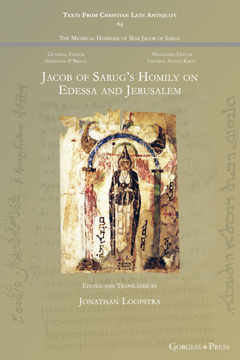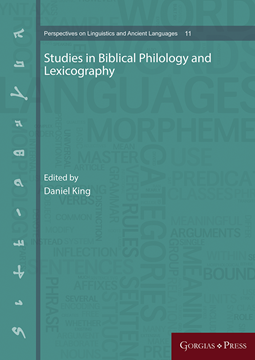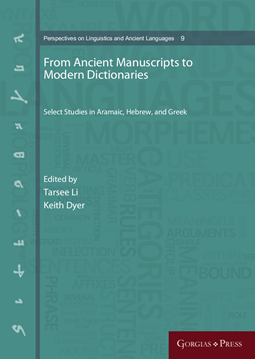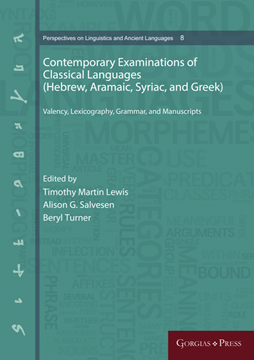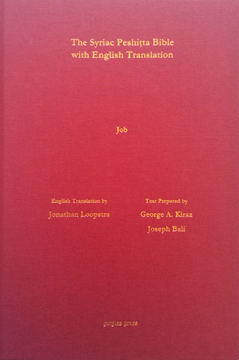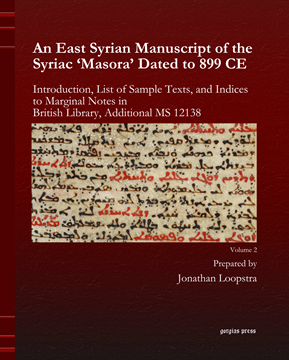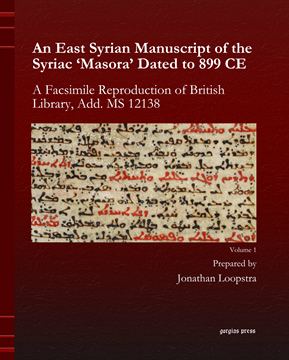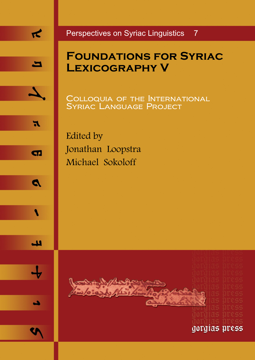Jonathan Loopstra

Jonathan Loopstra is an Associate Professor of History at University of Northwestern in St. Paul, MN. He holds an M.St. degree in Syriac Studies from the University of Oxford, a M.A. from Trinity Evangelical Divinity School, and a Ph.D. from the Catholic University of America. He works primarily in the fields of Patristics and Middle Eastern Studies, with a particular interest in the history and theology of various Christian communities of the Middle East.
Jacob of Sarug's Homily on Edessa and Jerusalem
Edited and Translated by Jonathan Loopstra
Series: Texts from Christian Late Antiquity 64
ISBN: 978-1-4632-4335-7
Recognized as a saint by both Chalcedonian and non-Chalcedonian Christians alike, Jacob of Sarug (d. 521) produced many narrative poems that have rarely been translated into English. Of his reported 760 metrical homilies, only about half survive. Part of a series of fascicles containing the bilingual Syriac-English editions of Saint Jacob of Sarug’s homilies, this volume contains his homily on Edessa and Jerusalem. The Syriac text is fully vocalized, and the translation is annotated with a commentary and biblical references. The volume is one of the fascicles of Gorgias Press’s Complete Homilies of Saint Jacob of Sarug, which, when complete, will contain all of Jacob’s surviving sermons.
$35.00 (USD)
Studies in Biblical Philology and Lexicography
Edited by Daniel King
ISBN: 978-1-4632-4035-6
This volume offers papers that emerged from the meeting of the International Syriac Language Project (ISLP) which took place at Stellenbosch University, South Africa, in September 2016, and at the Humboldt-Universität zu Berlin, in August 2017. The ISLP invites research not only into Syriac, but extends its range to all ancient language lexicography. Hence its proceedings enrich the whole field of Syriac, Hebrew, and Greek lexicography. The ISLP especially encourages research into the interfaces between these languages, and hence the current volume contains a number of papers on translation equivalence: Hebrew-Greek, Hebrew-Syriac, and Greek-Syriac. Other philologically focused pieces explore matters relating to textual and manuscript traditions. All of these are preceded in the present volume by an extensive review of the production and achievements of the ISLP to date.
$149.00 (USD)
From Ancient Manuscripts to Modern Dictionaries
Select Studies in Aramaic, Hebrew, and Greek
Edited by Tarsee Li & Keith Dyer
ISBN: 978-1-4632-0608-6
These articles on Aramaic, Hebrew, and Greek lexicography have arisen from papers presented at the International Syriac Language Project's 14th International Conference in St. Petersburg in 2014.
$211.00 (USD)
Contemporary Examinations of Classical Languages (Hebrew, Aramaic, Syriac, and Greek)
Valency, Lexicography, Grammar, and Manuscripts
ISBN: 978-1-4632-0656-7
Ancient language study is becoming an increasingly sophisticated and complex discipline, as scholars not only consider methods being used by specialists of other languages, but also absorb developments in other disciplines to facilitate their own research investigations. This interdisciplinary approach is reflected in the scope of research papers offered here, invited and peer-reviewed by the ISLP.
$153.00 (USD)
Job According to the Syriac Peshitta Version with English Translation
Series: Surath Kthob 16
ISBN: 978-1-4632-0554-6
This volume is part of a series of English translations of the Syriac Peshitta along with the Syriac text carried out by an international team of scholars. Loopstra has translated the text, while Kiraz has prepared the Syriac text in the west Syriac script, fully vocalized and pointed. The translation and the Syriac text are presented on facing pages so that both can be studied together. All readers are catered for: those wanting to read the text in English, those wanting to improve their grasp of Syriac by reading the original language along with a translation, and those wanting to focus on a fully vocalized Syriac text.
$150.00 (USD)
An East Syrian Manuscript of the Syriac 'Masora' Dated to 899 CE (Volume 2)
Introduction, List of Sample Texts, and Indices to Marginal Notes in British Library, Additional MS 12138
Prepared by Jonathan Loopstra
ISBN: 978-1-4632-0391-7
This unique manuscript of the East Syrian Syriac ‘Masora’ is essential for any study of early Syriac vocalization, accentuation, and punctuation. In Volume 1, Gorgias Press has published a facsimile reproduction of this unique ‘masoretic’ manuscript. This volume (Volume 2) includes an introduction and comprehensive lists of all scriptural sample texts and marginal notes in this compilation.
$228.00 (USD)
An East Syrian Manuscript of the Syriac 'Masora' Dated to 899 CE (Volume 1)
A Facsimile Reproduction of British Library, Add. MS 12138
Prepared by Jonathan Loopstra
ISBN: 978-1-61143-896-3
This unique manuscript of the East Syrian Syriac ‘Masora’ is essential for any study of early Syriac vocalization, accentuation, and punctuation. This volume presents a facsimile reproduction of this ‘masoretic’ manuscript. An introduction and comprehensive scriptural indices will be included in a forthcoming volume.
$263.00 (USD)
Foundations for Syriac Lexicography V
Colloquia of the International Syriac Language Project
Edited by Jonathan Loopstra & Michael Sokoloff
Series: Perspectives on Syriac Linguistics 7
ISBN: 978-1-61719-027-8
The fifth published colloquia of the International Syriac Language Project (ISLP), presenting papers from an international team of authors working to develop contemporary, interdisciplinary approaches to linguistics and lexicography.
$165.00 (USD)

